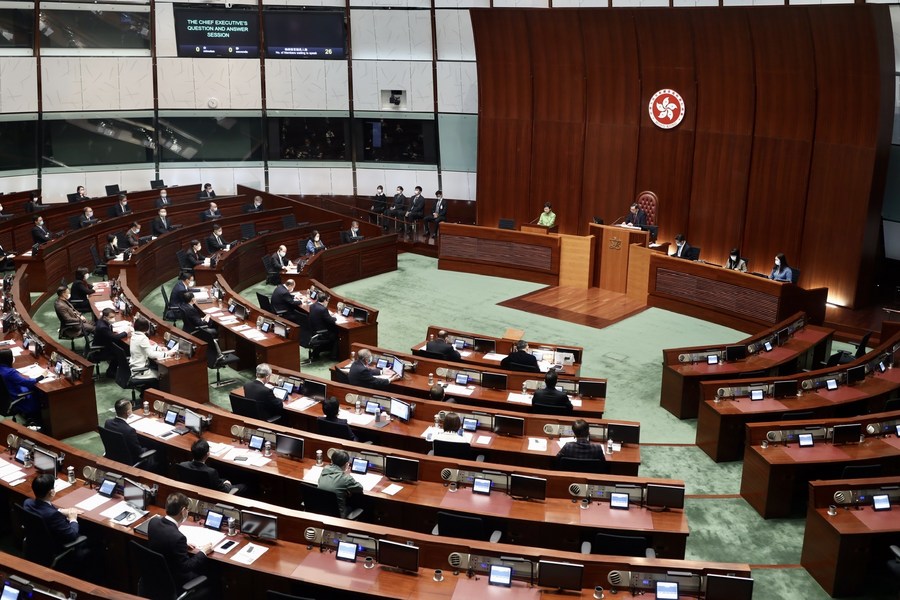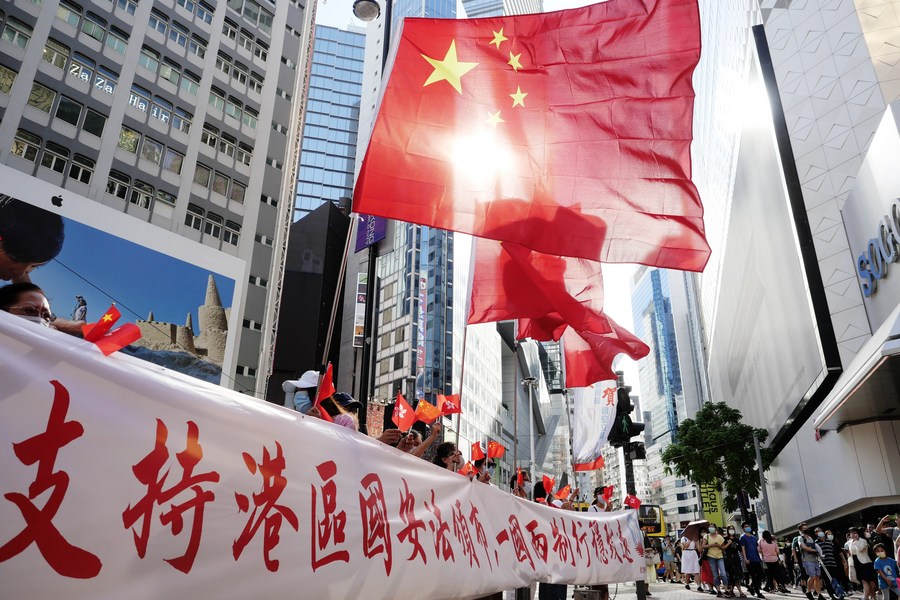


Chief Executive of China's Hong Kong Special Administrative Region (HKSAR) Carrie Lam attends the question and answer session in the Legislative Council (LegCo) in Hong Kong, south China, Feb. 4, 2021. (Xinhua/Lui Siu Wai)
BEIJING, March 5 (Xinhua) -- The National People's Congress (NPC), China's top legislature, on Friday started deliberating a draft decision on improving the electoral system of the Hong Kong Special Administrative Region (HKSAR).
The draft decision was submitted to the fourth annual session of the 13th NPC. Wang Chen, vice chairman of the NPC Standing Committee, delivered an explanatory speech on the draft at the opening meeting of the session.
IMPERATIVE, IMPORTANCE
As an important part of the political structure of the HKSAR, its electoral system should conform to "one country, two systems," meet the realities in the HKSAR and serve to ensure "patriots administering Hong Kong," Wang said.
However, in recent years, especially after the turbulence over the amendment bill in 2019, anti-China, destabilizing forces and radical localists in Hong Kong have openly called for "Hong Kong independence." They used the electoral platforms of the HKSAR and the deliberation platforms of the Legislative Council (LegCo) and the District Councils or their position as public servants to blatantly carry out anti-China and destabilizing activities, he said.
The rioting and turbulence that occurred in the Hong Kong society reveals that the existing electoral system in the HKSAR has clear loopholes and deficiencies, which the anti-China, destabilizing elements jumped on to take into their hands the power to administer the HKSAR, he added.
Necessary measures must be taken to improve the electoral system and remove existing institutional risks to ensure the administration of Hong Kong by Hong Kong people with patriots as the main body, Wang noted.
Only when the principle of "patriots administering Hong Kong" is observed can the central authorities' overall jurisdiction over the HKSAR be effectively implemented, the constitutional order as established by the Constitution and the Basic Law be effectively maintained, and the various deep-seated problems be effectively resolved. Only in this way can Hong Kong achieve durable stability and make its due contributions to realizing national rejuvenation, according to the senior lawmaker.
The electoral system of the HKSAR, including the methods for the selection of the Chief Executive and for the formation of the LegCo, must strictly follow and fully reflect the political principle and criterion of the administration of Hong Kong by Hong Kong people with patriots as the main body, and provide institutional safeguards for this purpose, he said.

Hong Kong residents celebrate the passage of the Law of the People's Republic of China on Safeguarding National Security in the Hong Kong Special Administrative Region (HKSAR) in Causeway Bay of south China's Hong Kong, June 30, 2020. (Xinhua/Wang Shen)
OVERARCHING APPROACH
Explaining the overarching approach for improving the electoral system, Wang said the overall design of the system will be centered around the reformation and greater empowerment of the Election Committee of the HKSAR.
The size, composition and formation method of the Election Committee will be adjusted and improved. The Chief Executive will continue to be elected by the Election Committee. The Election Committee will be entrusted with the new function of electing a relatively large share of LegCo members and directly participating in the nomination of all candidates for the LegCo, he said.
Through the Election Committee, the balanced and orderly political participation will be expanded and broader representation ensured in the Hong Kong society. Relevant elements of the election will be adjusted as appropriate, and a mechanism of qualification review will be established throughout the entire process, he added.
This design is aimed to form a new democratic electoral system suited to Hong Kong's realities and with Hong Kong characteristics, Wang noted.
In order to maintain continuity and stability of relevant systems of the HKSAR, the revisions to be made this time in improving the electoral system may be limited to Annex I and Annex II to the Basic Law, without revising the main body of the Basic Law.
"DECISION PLUS AMENDMENT"
After serious consideration of various factors and discussions with relevant parties, central and state authorities propose a two-step approach, namely, "decision plus amendment," according to Wang.
In the first step, the NPC, in accordance with the relevant provisions of the Constitution, the Basic Law, and the Law on Safeguarding National Security in the HKSAR, makes the decision on improving the electoral system of the HKSAR, which lays out the basic principles for revising and improving the electoral system of the HKSAR as well as the core elements of such revision and improvement. Meanwhile, the NPC authorizes its standing committee to amend Annex I and Annex II to the Basic Law in accordance with the decision, Wang said.
In the second step, in accordance with the Constitution, the Basic Law, the Law on Safeguarding National Security in the HKSAR, and the NPC decision, the NPC Standing Committee amends Annex I and Annex II of the Basic Law of the HKSAR, he said.
The amended Annex I and Annex II will contain specific and express provisions on the new democratic electoral system of the HKSAR. After the amendment of Annex I and Annex II at the state level is completed, the HKSAR will amend relevant local laws accordingly, he added.

 Award-winning photos show poverty reduction achievements in NE China's Jilin province
Award-winning photos show poverty reduction achievements in NE China's Jilin province People dance to greet advent of New Year in Ameiqituo Town, Guizhou
People dance to greet advent of New Year in Ameiqituo Town, Guizhou Fire brigade in Shanghai holds group wedding
Fire brigade in Shanghai holds group wedding Tourists enjoy ice sculptures in Datan Town, north China
Tourists enjoy ice sculptures in Datan Town, north China Sunset scenery of Dayan Pagoda in Xi'an
Sunset scenery of Dayan Pagoda in Xi'an Tourists have fun at scenic spot in Nanlong Town, NW China
Tourists have fun at scenic spot in Nanlong Town, NW China Harbin attracts tourists by making best use of ice in winter
Harbin attracts tourists by making best use of ice in winter In pics: FIS Alpine Ski Women's World Cup Slalom
In pics: FIS Alpine Ski Women's World Cup Slalom Black-necked cranes rest at reservoir in Lhunzhub County, Lhasa
Black-necked cranes rest at reservoir in Lhunzhub County, Lhasa China's FAST telescope will be available to foreign scientists in April
China's FAST telescope will be available to foreign scientists in April